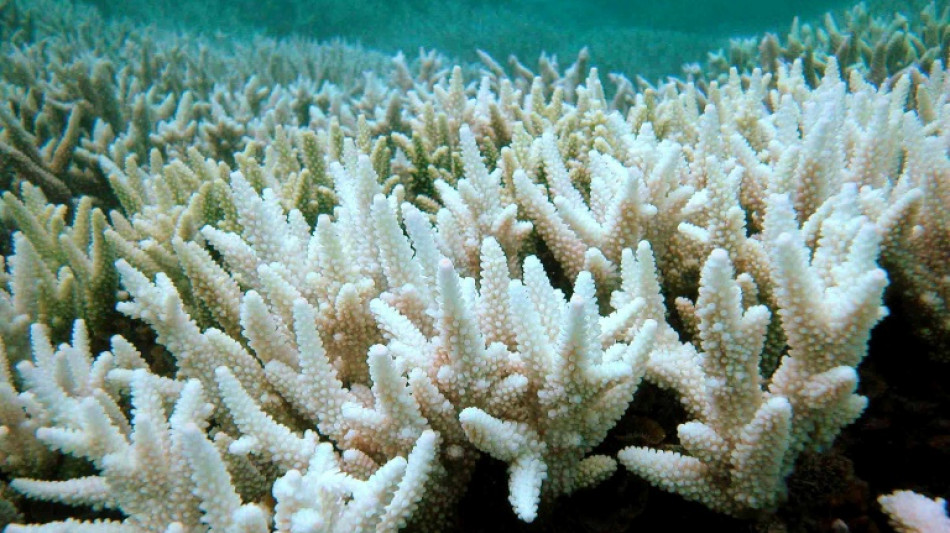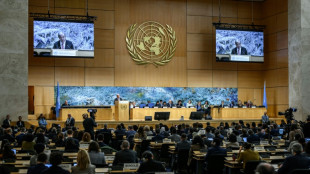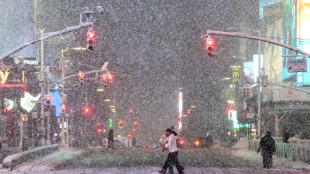
-
 Snowstorm blankets US northeast as New York sees travel ban
Snowstorm blankets US northeast as New York sees travel ban
-
Healthcare crisis looms over Greenland's isolated villages

-
 Hodgkinson says breaking 800m record would put her among athletics' greatest
Hodgkinson says breaking 800m record would put her among athletics' greatest
-
Two Russian security personnel were on board France-seized tanker: sources

-
 EU puts US trade deal on ice after Supreme Court ruling
EU puts US trade deal on ice after Supreme Court ruling
-
Hetmyer blasts 85 as West Indies pile up 254-6 against Zimbabwe

-
 Canada PM heads to Asia seeking new trade partners as US ties fray
Canada PM heads to Asia seeking new trade partners as US ties fray
-
South Africa accepts Trump's new US ambassador

-
 Iraq's Maliki defends PM candidacy, seeks to reassure US
Iraq's Maliki defends PM candidacy, seeks to reassure US
-
UEFA suspend Benfica's Prestianni after alleged racist abuse

-
 Jetten sworn in as youngest-ever Dutch PM
Jetten sworn in as youngest-ever Dutch PM
-
Italy's Enel to invest 20bn euros in renewables by 2028

-
 BBC apologises for 'involuntary' Tourette's racial slur during BAFTA awards
BBC apologises for 'involuntary' Tourette's racial slur during BAFTA awards
-
Kristen Bell returns to host glitzy Actor Awards in Hollywood

-
 Iran says would respond 'ferociously' to any US attack
Iran says would respond 'ferociously' to any US attack
-
Venezuelan foreign minister demands 'immediate release' of Maduro

-
 Dane Vingegaard to start season at Paris-Nice in March
Dane Vingegaard to start season at Paris-Nice in March
-
Australia PM backs removing UK's Andrew from line of succession

-
 Where do Ukraine and Russia stand after four years of war?
Where do Ukraine and Russia stand after four years of war?
-
Police investigating racist abuse of Premier League quartet

-
 Fiji to start Nations Championship at 'home' to Wales in Cardiff
Fiji to start Nations Championship at 'home' to Wales in Cardiff
-
EU lawmakers to put US trade deal on hold after Supreme Court ruling

-
 Rubio to attend Caribbean summit as US presses Venezuela, Cuba
Rubio to attend Caribbean summit as US presses Venezuela, Cuba
-
'Ugly' England aim to spin their way to T20 World Cup semi-finals

-
 Nigeria paid Boko Haram ransom for kidnapped pupils: intel sources
Nigeria paid Boko Haram ransom for kidnapped pupils: intel sources
-
Tudor says Tottenham can still beat the drop despite Arsenal loss

-
 Violence sweeps Mexico after most-wanted drug cartel leader killed
Violence sweeps Mexico after most-wanted drug cartel leader killed
-
France giant Meafou capable of being 'world's best' lock

-
 Stocks diverge, dollar down over Trump tariffs uncertainty
Stocks diverge, dollar down over Trump tariffs uncertainty
-
World champions South Africa announce eight home Tests for 2026/27

-
 Liverpool boss Slot encouraged by Mac Allister's return to form
Liverpool boss Slot encouraged by Mac Allister's return to form
-
India replaces British architect statue with independence hero

-
 Pakistan warn England's flaky batting to expect a trial by spin
Pakistan warn England's flaky batting to expect a trial by spin
-
Philippines' Duterte authorised murders, ICC told as hearings open

-
 Iran says would respond 'ferociously' to any US attack, even limited strikes
Iran says would respond 'ferociously' to any US attack, even limited strikes
-
New Dutch government sworn in under centrist Jetten

-
 What the future holds for the CJNG cartel after leader killed
What the future holds for the CJNG cartel after leader killed
-
ICC kicks off pre-trial hearing over Philippines' Duterte

-
 UN chief decries global rise of 'rule of force'
UN chief decries global rise of 'rule of force'
-
Nemesio Oseguera, the brutal Mexican drug lord known as 'El Mencho'

-
 Senegal's Sahad, radiant champion of 'musical pan-Africanism'
Senegal's Sahad, radiant champion of 'musical pan-Africanism'
-
New York orders citywide travel ban as major storm hits US

-
 'Considered a traitor': Life of an anti-war Ukrainian in Russia
'Considered a traitor': Life of an anti-war Ukrainian in Russia
-
South Korea and Brazil sign deals on K-beauty, trade

-
 Zimbabwe farmers seek US help over long-promised payouts
Zimbabwe farmers seek US help over long-promised payouts
-
Hong Kong appeals court upholds jailing of 12 democracy campaigners

-
 India battle for World Cup survival after 'messing up on grand scale'
India battle for World Cup survival after 'messing up on grand scale'
-
'I will go': Bengalis in Pakistan hope for family reunions

-
 North Korea touts nuclear advances as Kim re-chosen to lead ruling party
North Korea touts nuclear advances as Kim re-chosen to lead ruling party
-
South Korea protests 'Victory' banner hung from Russian embassy


Corals doomed even if global climate goals met: study
Coral reefs that anchor a quarter of marine wildlife and the livelihoods of more than half-a-billion people will most likely be wiped out even if global warming is capped within Paris climate goals, researchers said Tuesday.
An average increase of 1.5 degrees Celsius above pre-industrial levels would see more than 99 percent of the world's coral reefs unable to recover from ever more frequent marine heat waves, they reported in the journal PLOS Climate.
At two degrees of warming, mortality will be 100 percent according to the study, which used a new generation of climate models with an unprecedented resolution of one square kilometre.
"The stark reality is that there is no safe limit of global warming for coral reefs," lead author Adele Dixon, a researcher at the University of Leeds' School of Biology, told AFP.
"1.5C is still too much warming for the ecosystems on the frontline of climate change."
The 2015 Paris Agreement enjoins nearly 200 nations to keep global heating "well below" 2C (36 degrees Fahrenheit).
But with more deadly storms, floods, heatwaves and droughts after only 1.1C of warming to date, the world has embraced the treaty's more ambitious aspirational goal of a 1.5C limit.
A landmark report in August by the UN's IPCC climate science panel said global temperatures could hit the 1.5C threshold as soon as 2030.
In 2018, the IPCC predicted that 70 to 90 percent of corals would be lost at the 1.5C threshold, and 99 percent if temperatures rose another half-a-degree.
The new findings suggest those grim forecasts were in fact unduly optimistic.
- Marine heatwaves -
"Our work shows that corals worldwide will be even more at risk from climate change than we thought," Dixon said.
The problem is marine heatwaves and the time it takes for living coral to recover from them, a healing period known as "thermal refugia".
Coral communities usually need at least 10 years to bounce back, and that's assuming "all other factors" -- no pollution or dynamite fishing, for example -- "are optimal", said co-author Maria Berger, also at Leeds.
But increased warming is reducing the length of thermal refugia beyond the ability of corals to adapt.
"We project that more than 99 percent of coral reefs will be exposed at 1.5C to intolerable thermal stress, and 100 percent of coral reefs at 2C," Berger told AFP.
Australia's Great Barrier Reef, the largest coral system in the world, has seen five mass bleaching events in the last 25 years.
An unpublished study obtained by AFP, written by experts at the US National Oceanic and Atmospheric Administration's Coral Reef Watch unit, says the Great Barrier Reef was in the grips of a record-breaking heat spell yet again in November and December.
Oceans absorb about 93 percent of the excess heat from greenhouse gas emissions, shielding land surfaces but generating huge, long-lasting marine heatwaves that are already pushing many species of corals past their limits of tolerance.
A single so-called bleaching event in 1998 caused by warming waters wiped out eight percent of all corals.
Coral reefs cover only a tiny fraction -- 0.2 percent -- of the ocean floor, but they are home to at least a quarter of all marine animals and plants.
Besides supporting marine ecosystems, they also provide protein, jobs and protection from storms and shoreline erosion for hundreds of millions of people worldwide.
The value of goods and services from coral reefs is about $2.7 trillion per year, including $36 billion in tourism, the report said.
Global warming, with the help of pollution, wiped out 14 percent of the world's coral reefs from 2009 to 2018, leaving graveyards of bleached skeletons where vibrant ecosystems once thrived, recent research has shown.
Loss of coral during that period varied by region, ranging from five percent in East Asia to 95 percent in the eastern tropical Pacific.
S.Abdullah--SF-PST



